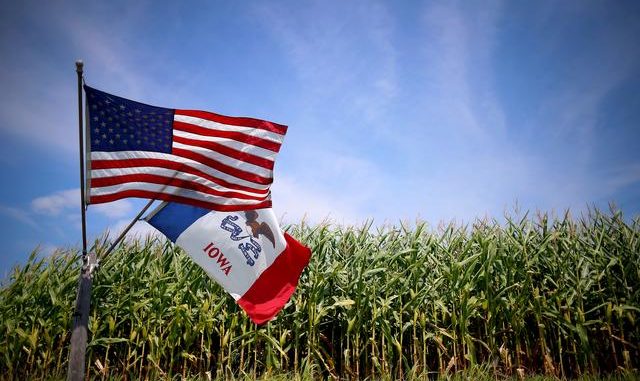
The agriculture and biofuel industries and their U.S. congressional allies ramped up pressure on the Trump administration on Wednesday over the relief he has given oil refiners from rules requiring use of biofuels.FILE PHOTO: U.S. and Iowa state flags are seen next to a corn field in Grand Mound, Iowa, United States, in this August 16, 2015 file photo. REUTERS/Jim Young/Files/File Photo
Long-suffering American farmers, a constituency President Donald Trump is counting on in his campaign for re-election in 2020, have seen prices for crops hit hard by his trade war with China. This month, farmers also complained that a government crop report did not reflect damage from historic flooding this spring.
Farmers have been infuriated at the administration’s decision to grant waivers exempting 31 oil refineries from rules requiring them to blend corn-based ethanol into gasoline.
National and state trade groups along with their political allies delivered letters to the White House over the past 48 hours detailing the damage the waivers have caused the biofuel industry.
Democratic presidential hopefuls have used the refinery issue as a cudgel, echoing farm groups who say Trump has betrayed them by siding with Big Oil. Alarmed, the Republican president ordered his cabinet to find ways to boost biofuel demand.
ADVERTISEMENT
The Iowa Soybean Association’s letter to the White House said the refining exemptions were forcing biodiesel producers to shut plants and lay off workers. Soybeans are a feedstock for biodiesel, so growers have been hurt.
“It’s becoming more difficult to understand why your administration is choosing to support higher profits for oil companies instead of providing some stability for farmers,” said the letter, signed by Lindsay J. Greiner, president of the state’s soybean association.
Iowa, the largest U.S. producer of corn and ethanol, is a swing state won twice by Democrat Barack Obama. The state switched to the Republican candidate in 2016, in part because Trump promised to support ethanol.
Cindy Axne, a Democrat who represents Iowa’s third district, wrote to the U.S. Environmental Protection Agency, urging its independent watchdog to investigate the small refinery waivers granted between 2016 and 2018.
“What we’re seeing with this administration is a dogged approach to allow the biggest fossil fuel players an opportunity to put more money back in the pockets of their large shareholders and take that money out of the pockets of hardworking farmers right here in Iowa,” Axne said at a news conference.
Republican Iowa Governor Kim Reynolds, a Trump political ally, along with the state’s head of agriculture, said in a letter to the EPA that rural families have borne the brunt of the trade war and are now being pinched by the refinery waivers.
“Ethanol consumption fell for the first time in 20 years, commodity markets are depressed, and many biofuel plants, including several in Iowa, have already slowed or halted production,” the letter said.
‘MAKE IT RIGHT’
The battle between Big Oil and farmers over the U.S. biofuel policy has been a headache for Trump, who campaigned in 2016 as a champion for ethanol.
U.S. regulations require refiners to blend biofuels into the nation’s gasoline pool or buy credits to fund those refiners who can. Small refiners can get exemptions from the EPA if they prove compliance causes them hardship.
But Trump’s EPA expanded the waivers significantly, granting exemptions to refineries owned by the likes of Exxon Mobil Corp (XOM.N), Chevron Corp (CVX.N) and billionaire Carl Icahn. This saved refiners billions of dollars, but farmers complained that it has destroyed ethanol demand and forced plants to shut down or idle. Refiners maintain the waivers have not hurt overall demand for biofuels.Slideshow (2 Images)
Biofuel producers and farmers say increasing the annual blending obligations for 2020, to be finalized in November, is the best solution, but oil refiners oppose that.
“The president will have an opportunity to make this right in the fall,” Gene Gebolys, chief executive of biodiesel producer World Energy. The company said last week it was closing plants in Mississippi, Georgia and Pennsylvania, and putting 100 workers on furlough.
“If he doesn’t, the voters will have an opportunity to make it right next fall. He’s made a promise throughout the Midwest and he’s broken the promise,” he said.
Reporting by Humeyra Pamuk and Jarrett Renshaw; additional reporting by Stephanie Kelly; Editing by David
WASHINGTON/NEW YORK (Reuters) –
